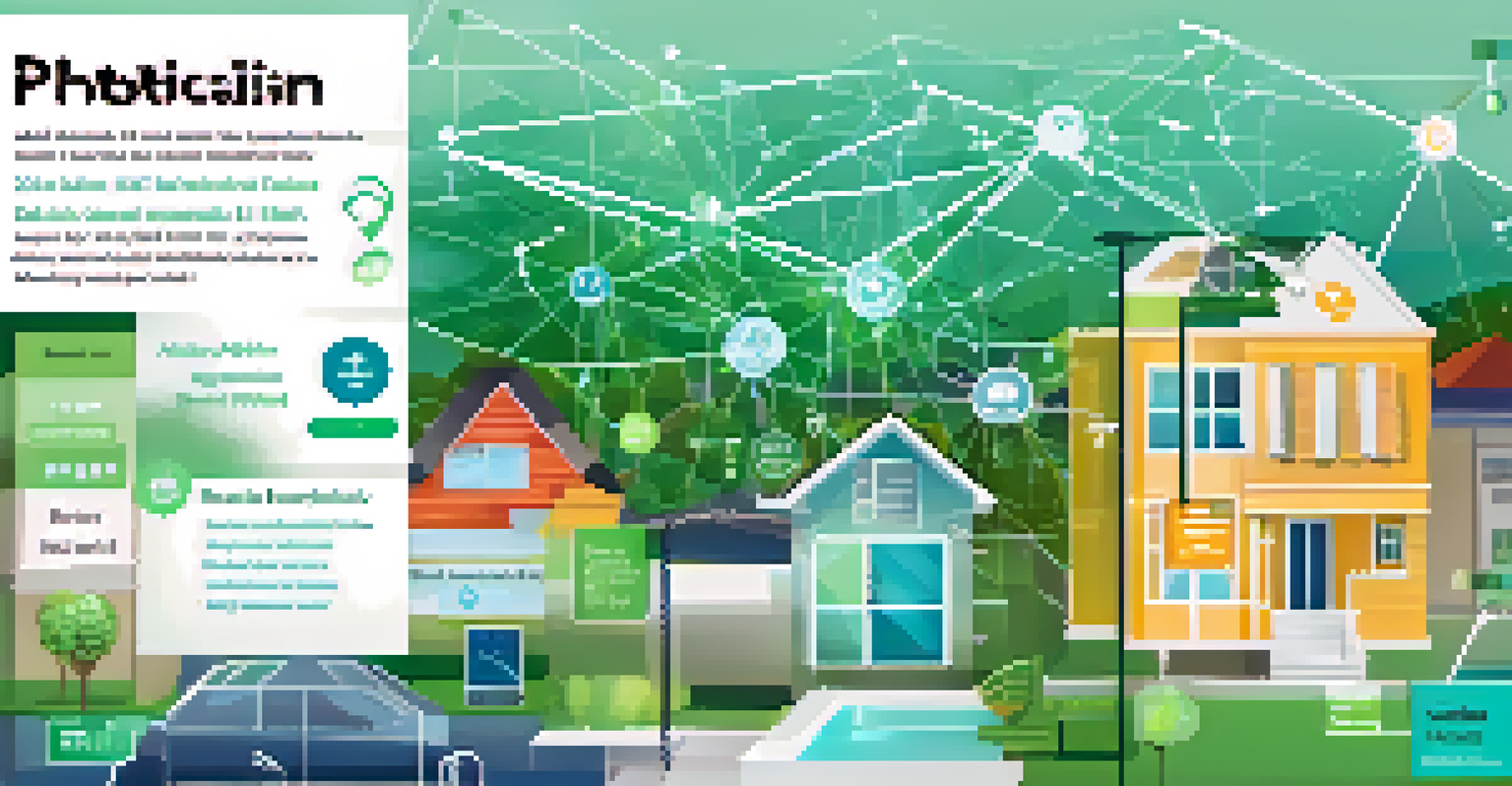Blockchain and Its Impact on Real Estate Market Efficiency

Understanding Blockchain Technology in Real Estate
Blockchain is a decentralized digital ledger that securely records transactions across multiple computers. In real estate, this means that property transactions can be documented transparently, reducing the chance of fraud. By using blockchain, buyers and sellers can trust that the information is accurate and immutable, which is a huge step forward from traditional methods.
Blockchain technology is a powerful tool that can help create a more transparent and efficient real estate market.
Imagine a world where you can buy a house without worrying about hidden liens or title issues. Blockchain provides a clear, tamper-proof history of ownership and transaction records, making it easier to verify property titles. This not only protects buyers but also streamlines the entire purchasing process, leading to quicker transactions.
As blockchain technology continues to evolve, its applications in real estate are becoming more sophisticated. Smart contracts, for example, automate and enforce agreements without the need for intermediaries. This innovation reduces the time and cost of transactions, ultimately benefiting everyone involved in the real estate market.
Eliminating Middlemen: Cost and Time Efficiency
One of the most significant impacts of blockchain in real estate is the reduction of intermediaries. Traditionally, buying or selling property often involves real estate agents, lawyers, and banks, each taking a cut of the transaction. By leveraging blockchain, many of these roles can be minimized or eliminated, leading to substantial cost savings.

For instance, consider a straightforward home sale. With blockchain, the buyer and seller can transact directly, using smart contracts to handle the transfer of funds and ownership. This means lower fees and faster closing times, making real estate transactions feel more like a simple online purchase rather than a complex bureaucratic process.
Blockchain Enhances Real Estate Trust
Blockchain technology provides a transparent and tamper-proof history of property transactions, reducing fraud and building trust among buyers and sellers.
Not only does this efficiency save money, but it also enhances the overall experience for buyers and sellers. Imagine how much smoother the process would be if you could complete a transaction in a matter of hours instead of weeks. This potential for acceleration can transform how we think about buying and selling property.
Enhancing Transparency and Trust in Transactions
Transparency is crucial in any financial transaction, especially in real estate, where significant amounts of money are at stake. Blockchain technology provides a transparent view of all transactions, which can be accessed by anyone involved in the process. This visibility helps build trust among parties, as everyone can verify the authenticity of the transaction history.
The future of real estate is not just about property; it's about harnessing technology to streamline processes and enhance trust.
Think of it like a glass box; everyone can see what’s happening inside. By having an open ledger, potential buyers can review the history of a property, including previous owners and any outstanding debts. This level of clarity reduces the likelihood of disputes and misunderstandings, creating a smoother experience for everyone.
In a market where trust is paramount, blockchain serves as a foundation for a more reliable system. As more people adopt this technology, the industry could see a shift toward more ethical practices, ultimately benefiting consumers and investors alike.
Improving Property Management and Development Processes
Blockchain can also revolutionize property management by streamlining maintenance requests and rental payments. With a decentralized system, property managers can easily track issues and ensure timely responses, leading to happier tenants. This efficiency can be a game-changer in maintaining property value and tenant satisfaction.
Consider a scenario where tenants can log maintenance requests directly onto a blockchain platform. Property managers receive instant notifications, and the entire process is documented for transparency. This immediate feedback loop not only enhances communication but also ensures that issues are resolved swiftly and effectively.
Reduced Costs by Eliminating Middlemen
By minimizing the roles of intermediaries like agents and lawyers, blockchain can significantly lower transaction costs and streamline the buying and selling process.
Moreover, developers can use blockchain to track the various stages of construction, ensuring that each phase is completed on time and within budget. By providing a clear chain of accountability, blockchain helps in reducing delays and increasing overall efficiency in property development.
Facilitating Fractional Ownership and Investment Opportunities
Blockchain opens the door to fractional ownership, making real estate investment accessible to a broader audience. By dividing property into shares, individuals can invest in real estate without the need to purchase an entire property. This democratization of investment allows more people to participate in the real estate market.
Imagine being able to own a fraction of a luxury property or a commercial building without the hefty price tag. With blockchain, investors can purchase shares and receive dividends based on the property's revenue. This innovation not only increases investment opportunities but also encourages diversification in investment portfolios.
As more platforms emerge that facilitate fractional ownership through blockchain, the landscape of real estate investing is expected to change dramatically. This could lead to increased liquidity in the market, allowing investors to buy and sell shares more easily than traditional real estate transactions.
Challenges and Considerations for Blockchain Adoption
Despite its many advantages, the adoption of blockchain in real estate isn't without challenges. Regulatory hurdles and the need for a robust legal framework are significant barriers to entry. As governments and agencies work to establish guidelines, the pace of adoption may vary across regions.
Additionally, there’s a learning curve associated with implementing new technology. Industry professionals must be educated on how to use blockchain effectively, which may require time and investment. The transition from traditional systems to blockchain can be daunting but is essential for future efficiency.
Fractional Ownership Expands Access
Blockchain facilitates fractional ownership of properties, allowing more individuals to invest in real estate without needing substantial capital.
Furthermore, concerns about data privacy and security will need to be addressed. While blockchain is inherently secure, the surrounding infrastructure must also be robust to protect sensitive information. Balancing innovation with security will be crucial as the industry moves forward.
The Future of Real Estate with Blockchain Technology
As we look to the future, blockchain has the potential to reshape the entire real estate landscape. The efficiencies gained through transparency, trust, and reduced costs could lead to a more robust and agile market. Stakeholders who embrace this technology early on may find themselves ahead of the curve.
Imagine a world where property transactions are as simple as sending an email. With blockchain, we could see a shift toward automated, streamlined processes that make buying and selling homes more user-friendly. This evolution could attract a new generation of buyers and investors eager to engage with the market.

Ultimately, the successful integration of blockchain into real estate will depend on collaboration among industry players, regulators, and technology providers. If all parties work together, we can create a more efficient, transparent, and accessible real estate market for everyone.